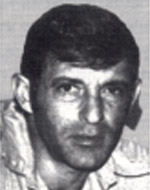Son of Paula and Raphael, was born on the 13th of Tevet 5686 in Tel Aviv. Until the age of 13, Amnon grew up in his father’s house, a well-known poet in Hebrew literature circles. He belonged to the Hashomer Hatzair movement and at the age of 13 moved with his brother to Kibbutz Beit Alpha, in the Jezreel Valley, where he was educated as a “foreign boy”. He studied at the Gilboa educational institution in the Emek and grew up in the Dror group. Most of the group volunteered, when they were drafted, to the paratroopers. “When he was interested in astronomy, he bought binoculars and at night a lot to watch the stars.” When he was interested in music he acquired a trumpet and learned how to play it, and he was very tolerant. In November 1954, Amnon enlisted in the paratroopers, underwent basic training, and in 1955 he underwent a parachuting course. He then completed a course for squad commanders in 1956 and was promoted to Corporal. During the Sinai Campaign, Amnon was in the infantry officers course, completing the course in September 1956, being promoted to the rank of lieutenant colonel and assigned as a platoon commander in a paratroopers unit. Two years later, in July 1958, he rose to the rank of lieutenant and continued to serve on permanent terms until November 1958. In 1961 Amnon completed a course for company commanders. He was promoted to the rank of captain in his capacity as commander of an infantry company in the reserves, he fought in the Six-Day War and at the end of the war, in June 1967, was promoted to Major. Amnon participated in military activity along the Jordan Valley, commanded a unit that dealt with the pursuit of terrorists, and in one of the operations he was wounded and hospitalized. When he was released from the army, Amnon returned to his kibbutz, to Beit Alpha, where he held many diverse positions: he married and his children were born, and he continued to divide between his obligations to the kibbutz and his duties to the IDF. About his life on the kibbutz, his friends told him: “He was a fieldman, loved trips, gave him confidence.” He was devoted to his family on the kibbutz and spent his spare time trying to spend time with them. In January 1971, Amnon underwent a training course for commanders of the course: “He has a good knowledge of the material, participates in a reasonable amount of lessons, takes a serious position and is well aware of the duties incumbent on him. His works are written in the most accurate and accurate manner. His operability is good and the presentation of matters is orderly. Energetic role-playing. Who has a good spirit and is one of the pillars of the team. “After the war, in July 1974, Amnon Samah was appointed as the commander of a battalion, And went on to become a lieutenant colonel.In his civilian life he continued to fulfill his duties on the kibbutz, and for a short time went abroad to work, and when he returned to Israel, he returned to his duties on the kibbutz. In 1980, he was appointed director of “Chimuir”, the spraying company of the working settlements. At that time, the company was in deep distress and was called to rescue it from difficulties. Amnon soon acquired the trust of the workers and re-raised the company in the way of economic success. For two years he ran the company until he fell in the war. During the War of Peace in the Galilee, in December 1982, Amnon was called up for reserve duty as a brigade commander, and his commanders said: “He is an excellent officer who has great experience and is mind-set and has peace of mind in carrying out every mission.” On Thursday, (21.12.1982), Amnon went out with a group of senior commanders on an early field patrol in preparation for a divisional drill. The jeep drove along a dirt road near the town of Qamad a-Luz, in the eastern sector. It went over a mine, and three officers were killed in the explosion: two lieutenant colonels and a major. Among those killed was Amnon. He was 47 when he died. He was laid to rest in the military section of IDF casualties in the Beit Alfa cemetery, leaving behind a wife, five sons and a brotherIn the light of a pamphlet in his memory, and presented it with his character, as a kibbutznik and as a fighter
